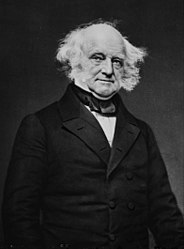The third Americano-British War

Nowadays state of Maine
The third Americano-British War, also called the Aroostook War, the Pork and Beans War, the Coon-Canuck War, the Lumberjack's War, took her roots in the 1783 Treaty of Paris, that recognized the independance of United States of America at the time; the boundary between the American district of Maine and the British colony of New Brunswick did not satisfy any of the countries, and then Maine accedded to the status of State in 1820, it begun to grant lands to settlers in the valley of the Aroostook River, which was nominally part of British North America, althrough its status was not clearly defined: some French-speaking inhabitants in the area even considered themselves forming part of a so-called independant republic of Madawaska...The representatives of Maine contested more and more the boundary, refusing the offers of arbitration from the Britishs.
In 1827, John Baker, an American woodsman, raised an American flag on the British territory, where he was subsequently arrested by British Colonial Authorities, jailed until he paid his fine of 25 pounds. Ten years later, the Democrat governor of Maine, Robert Dunlap, issued a general order announcing that Maine had been invaded by a foreign power. Both American and New Brunswick lumberjacks were cutting timber in the disputed territory, and then New Brunswick loggers seized the American Land Agent who was exercing there his deeds in 1838, war was now ready to explode. The Maine Governor Edward Kent called out his militiamen, as the New Brunswick Lieutenant Governor Sir John Harvey; both sides decided to refer the matter to their rulers; young queen Victoria for the Britishs, and President Van Buren for the Americans.


Queen Victoria of Hanover, who had ascended to the throne in 1837; Democrat president of United States Martin Van Buren, who took office the same year.
The newly elected President Van Buren first believed that the Boundary Dispute was nothing less than a lumberjacks' dispute, but then considered the prestige of the United States: after all, the last war against the British Empire only happened twenty years before, and the unexpected Mexican victory in Texas stopped for a while the American expansion to the Pacific. In order to defend the integrity of the United States, and to avoid future and worse boundary disputes with British North America, the Congress declared war on Britain in 1838.
The fall of Boston to an expedition led by British East India Company commissionners proved that the war would be long...
The Pastry War
Even if the repression of the Texas rebellion was successful, something broke in the Mexican conscience at that time. Most of all, the capture of General Santa Anna, the true ruler of Mexico, in the last days of the war: this gallant last stand from the Texans and this humilitation for the General proved that the latter was not totally invincible, maybe even too incompetent to insure his own safety; in the name of what logic should the Mexicans allow such a man to rule their destinies? Even if the trust of the aging Emperor Agustin was still intact, the rule of Santa Anna begun to crack.

The Texas rebellion gave ideas to the other states of Mexico: some by true will of independance against the arbitrary central power in Mexico City, others by the opportunism of garrison generals who tried to establish their own rule in their own countries or to be noticed by the Emperor, in the hope of being appointed President of Council in remplacement of Santa Anna. Vowing to return to the project of Federalist Constitution of 1824, revolts begun to spread throughout Mexico, which was just recovering from an unprecented national debt.

In this context, Mexico was saw from Europe as a poor country ruled by incomptent men and ripe for intervention from good-willed European powers. The widespread idea in the European courts was an European intervention in Mexico, putting an member of any royal family on the Mexican throne, and go for a reconquest of the whole Americas, in order to civilize a continent plaguened by civil wars and mad dictators. The most interested of these countries was France, which viewed herself as the protector of the Latin nations of America, such as in Louis-Philippe of Orléans' (see above), the current king of the Frenchs, point of view.
The current state of anarchy in the Mexican Empire permitted to France to find a casus belli: bunchs of drunk and unpaid soldiers was common practice in Mexico, and one of them looted the cake shop of a French immigrant, Mr. Remontel, in 1828...As he claimed so. Touching the French king himself, the incident persuaded the French government to demand 600,000 pesos in damages to the Mexican Government, in addition of the old debts that Mexico had towards France. Even if Mexico had finished to pay all his debts, such an amount of money was impossible to pay, and the Emperor had nothing to do but to refuse. In response, Louis-Philippe sent a fleet under Rear Admiral Charles Baudin to organize a blockade of the Gulf of Mexico, in addition to an assault on Veracruz port.

Rear Admiral Charles Baudin, with his missing arm.
The Pastry War, trigerred for nothing less than a vandalized shop of pastries, was beginning...
Martin Chaucha, 1838 - North America in Flames, Ciudad de Mexico, 2001








